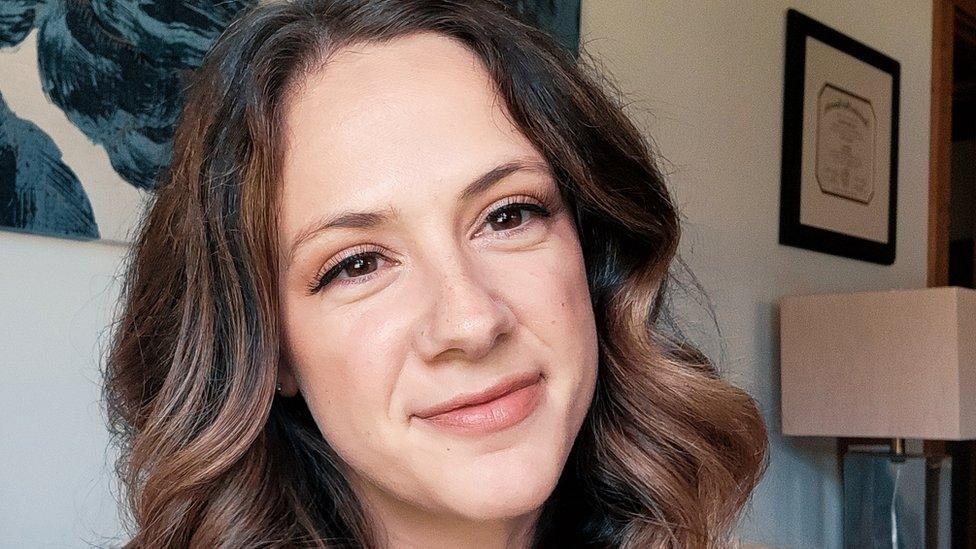New York cleaners create new path to entrepreneurship
- Published
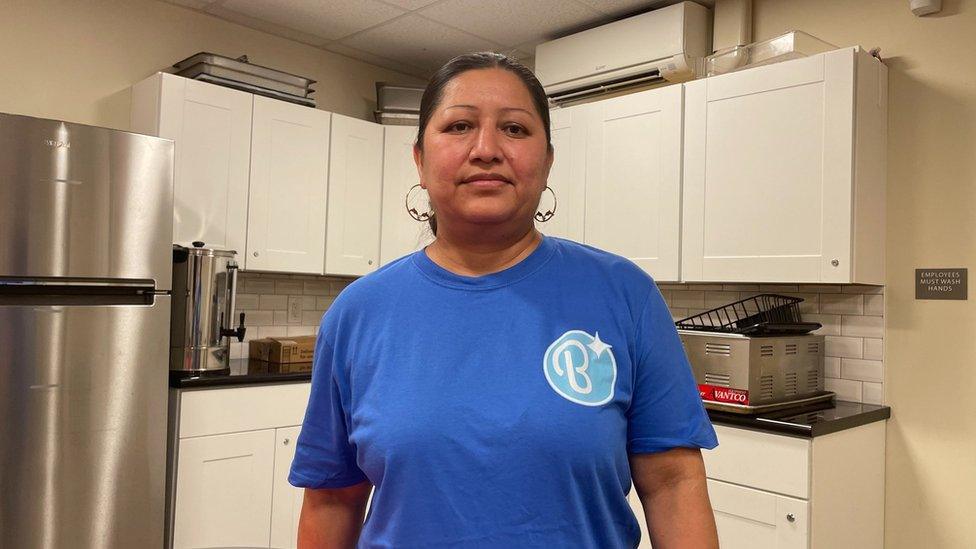
Julieta arrived in the US from Mexico 24 years ago
When Julieta Aquino leaves for work in the New York City neighbourhood of East Harlem, she does so on her own terms. She gets to decide when she works and what her pay is as a housecleaner, something she could only dream of in years gone by.
The change has come since she joined Brightly Cleaning - an immigrant-led, worker-owned co-operative in New York City that is trying to transform the gruelling job of cleaner into a path to entrepreneurship.
To do so, it is adapting the franchise business model - that which turned McDonald's into a global behemoth, with thousands of small business owners operating under a shared brand.
In this instance, Co-opportunity, a New York-based non-profit, acts as the corporate overlord, giving members access to the Brightly brand, marketing, training and tools like an online scheduling and payment system, that would be costly to create independently.
In return, it collects 5% of gross sales, which it says goes towards administrative costs.
The set-up makes it easier to start a business, allowing cleaners to become owners without having the tens of thousands of dollars on hand it can take to start a company.
But unlike a typical franchisor, Co-opportunity is governed by its members, with a "one worker, one vote" rule that applies to decision-making.
"What we did was we sort of turned the franchise model on its head. And we decided it should be owned by the workers themselves, not by an individual who would profit alone from them," says Julia Jean-François, the co-executive director at the Center for Family Life, the non-profit that helped launch Brightly in 2018.
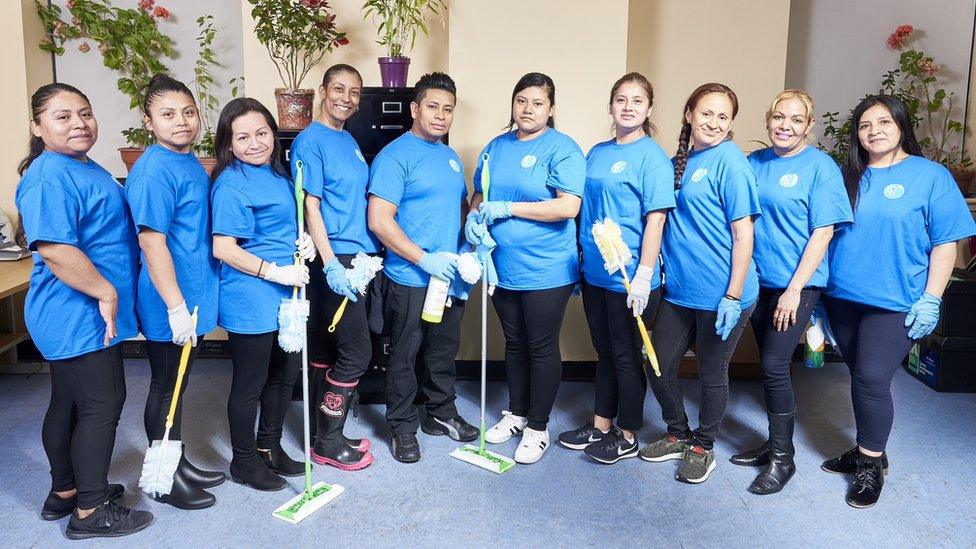
Brightly members seen here in 2019. Some of those pictured have since left the group
"What we've done is decided that the worker-owners can be their own engine of change, they can own the economy in their own way. And so, with the franchise model, they take on that role and responsibility. And we see now the incredible outcome of that."
There are now five Brightly locations, with dozens of worker-owners and more than 1,000 customers driving roughly one million dollars in sales.

Small Business USA
If it's true to say the US is the engine of the world economy, then small and medium-sized businesses are the fuel that drives that engine.
Small businesses create nearly two-thirds of new jobs in the workforce and account for 44% of US economic activity. So what's the secret to their success? What challenges do they face and which are the best cities and regions for them to thrive?

Julieta, who emigrated from Mexico 24 years ago, says she was initially hesitant when she heard about the idea through a social worker.
But the worker-owner model and better pay reeled her in. With Brightly, she earns $31 (£27) an hour - four times what she earned in her previous job and almost double the $17 average hourly wage for a cleaner in New York City.
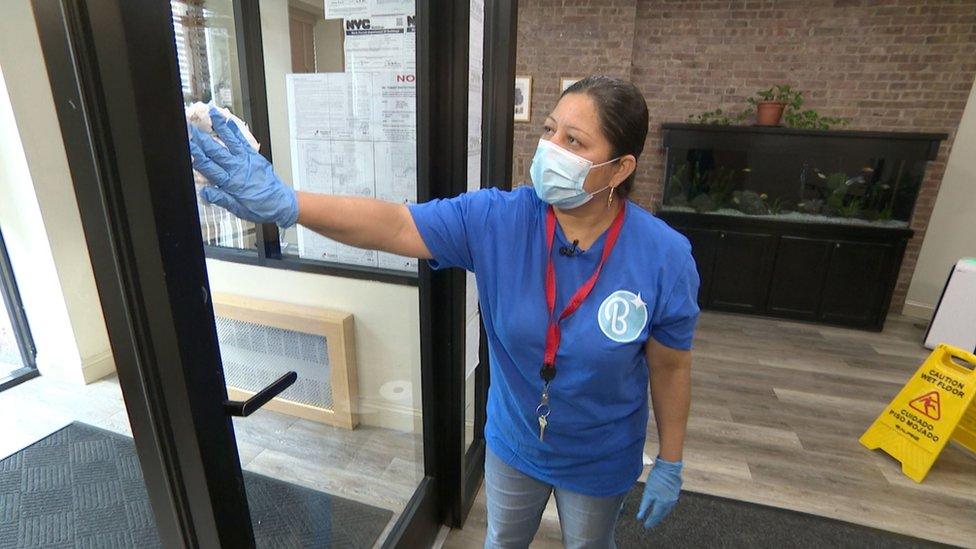
Julieta now earns $31 an hour
For Julieta, who spent years supporting her child by herself with bosses calling the shots, the highlight is setting her own schedule. "I give myself time for health and for my home. I can now focus on my quality of life. It's about me.
"It is an awakening because I used to say, 'No, this is just for those who study because they are intelligent, and I am not.'
"When I realised that I can be in finance, I can be in marketing, I can lead, it's not something that's impossible... I feel very proud."
Co-operatives have proven appealing to immigrants, like Julieta, who account for one in six workers in the US and are more likely to work in low-paying service jobs than American-born workers.
Immigrants are the country's biggest and fastest growing segment of worker-owners, according to the Democracy at Work Institute, which tracks co-ops around the country.
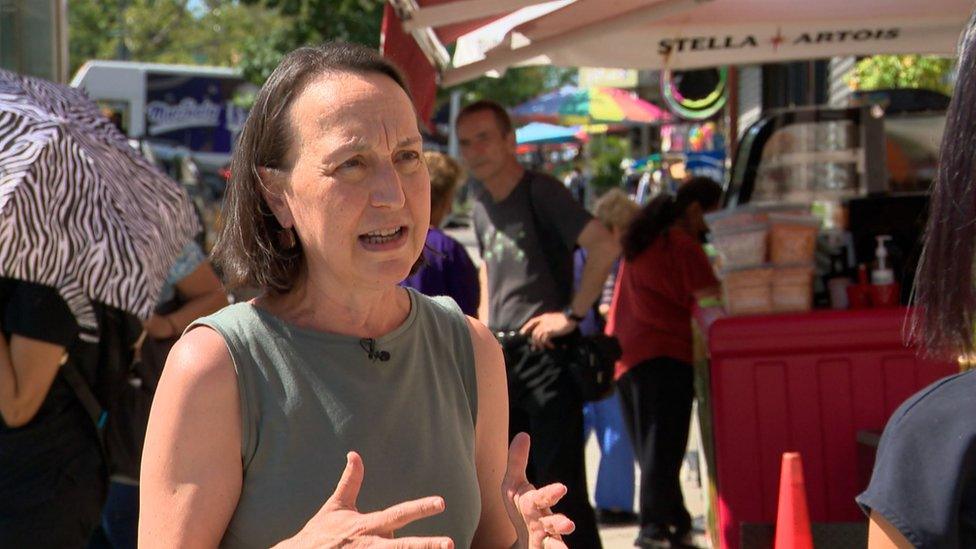
Julia Jean-François says Brightly "turned the franchise model on its head"
But such enterprises remain a tiny fraction of the US business landscape - numbering roughly 600, and employing about 6,000 people, according to the institute.
Co-operatives are often inefficient and have difficulty expanding, says Adria Scharf, an expert at the Rutgers Institute for the Study of Employee Ownership and Profit Sharing.
"We've been struggling with the issue of scale," she says. "The hope is that this franchise model could take more worker co-operatives to scale in a way that reaches and benefits many more workers, in particular workers who have been marginalised and excluded from more traditional workplace settings."
For now, however, Brightly remains the only co-op in the country that has tried to grow through a franchise model, raising questions about how easy it is to adapt.
The Center for Family Life created Brightly from scratch, a process that required costly legal expertise and months of negotiations with co-owners. Without ample financial backing, the process can be a deterrent to the low-income groups Brightly is trying to target.
Melissa Hoover, co-executive director for partnerships and growth at the Democracy at Work Institute, says the problem is that Brightly is ahead of its time.
"One of the reasons it's so hard to franchise worker-owned entities is the system is not set up for it," she says. "But with a few policy tweaks, you could make capital available. You can make small business supplements available, technical assistance.
"The franchise model is actually intended to make it easier to set up in the long run. Just keep your eye on the prize, and in like, five to 10 years, we'll have an ecosystem of support."
- Published12 October 2022
